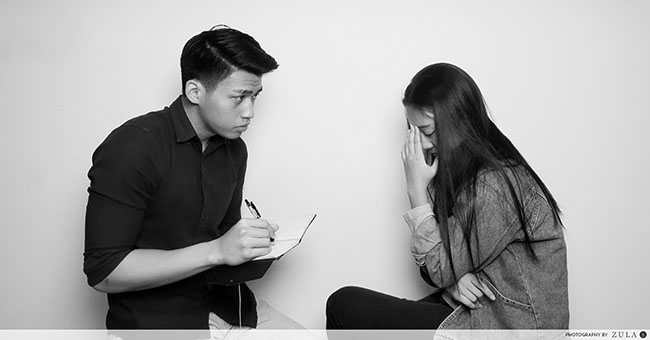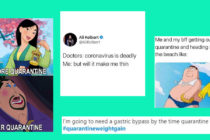Visiting A Therapist
I’m sitting in an empty white room, watching the clock tick by. It’s 2.05pm, and my therapist is late.
With every passing second, I’m thinking if I should walk away and pretend nothing happened. But no, I made a commitment to this ‘new year, new me’ bullshit, so I’ll keep waiting.
The door finally opens and an attractive man enters. As he walks towards me, I notice a tattoo on his left forearm.
“Hi, sorry I’m late. I’m Matthew.” We shake hands and he takes a seat opposite me. The lack of tables between us makes me self-conscious. Suddenly, I feel like I’m being interrogated.
“I know this is a weird question to start with, but tell me about yourself,” he adds.
Before I know it, I’m telling a complete stranger everything. What I study, what kind of person I am, and even how much I hate slow walkers during peak hours.
Lesson 1: You don’t have to know everything
I eventually tell Matthew about my problems with eating, and for a moment, I remain silent in embarrassment.
I watch him intently, hoping for a reaction, but his blank expression gives nothing away. I figure my best bet is to babble on, hoping something I say will be what he’s looking for.
But Matthew sees through my facade. “It’s okay not to know what to say, most people come because they don’t understand how they feel,” he assures me.
Immediately, I feel relieved.
With Matthew, I realise it’s needless to fill awkward silences with unnecessary chatter. For the first time, no one is going to ‘punish’ me if I say something wrong.
He asks me another question this time, and unlike before, I pause and let the silence sink in.
Albeit uncomfortable, I only say things I really mean, and it opens a floodgate of issues about my family.
Lesson 2: The problem is always a few layers deeper
As we continue chatting, Matthew helps me draw the link between my upbringing and my relationship with food.
He explains how my eating disorder is a symptom of my incessant need to be perfect.
From a young age, I’ve been pressured to be the perfect daughter for my parents, and a good role model for my siblings. Subconsciously, I placed unrealistic expectations on myself, and it made me afraid of failure.
If I fell short of these impossible ideals, or if I wasn’t as skinny as my parents wanted me to be, I’d deem myself unworthy of love and attention. When I didn’t receive validation from my parents, I’d coin myself a failure.
Lesson 3: Nothing is as simple as right/wrong or yes/no
“But you’re not a failure if you’ve gained a little weight,” Matthew replies. He describes how life works on a spectrum from good to bad, and how I need to recognise not everything is a loss if it didn’t exceed my own expectations.
It’s true, I’m not a failure. But my thick skull of a brain refuses to see that.
For the longest time, I could only see the world in black and white. If something wasn’t correct by my books, it was blatantly wrong.
It made it difficult to forgive myself for ‘mistakes’, like not topping the class for an exam. Every ‘failure’ to me was wrong, wrong, wrong.
Lesson 4: You can’t expect an overnight success
When the 50-minute session ends, Matthew gives me an assignment: to be kind to myself. Be it through eating foods I like or otherwise, he tells me to give myself credit when it’s due.
I promise to try but as much as I want to be kinder, I know it’s difficult to change overnight.
The next morning, I resist a bowl of muesli because it has too many calories and I only drink lemon water for lunch.
I go back to Matthew a week later, and rage about how I can’t break out of the cycle of starving myself. I was angry because therapy didn’t miraculously cure me.
In a measured tone, he tells me to practice patience. “Things don’t change unless you change,” he says.
Lesson 5: Therapy doesn’t make life easier but life gets better
Sure enough, some things did change, but some things took longer.
Every morning, I still wake up contemplating between cereal or water for breakfast. Every meal is still a mental battle between wanting to be skinny versus giving my body what it needs.
But if it wasn’t for therapy, I would still be convincing myself my ‘diet’ was more healthy than harmful.
Therapy forced me to confront my problems head-on and encouraged me to actively make better life choices.
While every day remains an uphill battle with food, life did get better because I’m winning on most days.
Getting Help
Though I don’t see Matthew anymore, I’m grateful his reassuring words pulled me out of the pit of darkness I found myself in.
Some days, I find myself back in the dark hole, other days I momentarily forget it even exists. But now whenever my thoughts get dark, I’m able to take comfort in knowing there’s always a way out, so long as I don’t give up.









